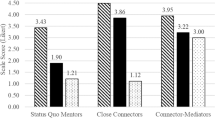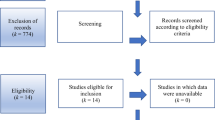Abstract
Natural mentors are important developmental assets for youth. To understand the nature and influence of natural mentors, scholars have often adopted Granovetter’s (1973) model, where “strong ties” refer to individuals in one’s close social network and “weak ties” refer to a broader network of heterogeneous relationships with nonfamilial others. This dichotomy can obscure the role of certain mentors like family friends and friend’s parents, who may transverse these categories. We used a multi-informant approach, drawing on mentee and mentor data from two nationally representative studies, to explore family friends and friend’s parents as a unique type of natural mentor. Study 1 (n = 3,133) uses Add Health data to explore the sociodemographic predictors of these mentors, whereas Study 2 (n = 343) uses the Power of Relationships Study to examine contexts, motivations, and perceived barriers associated with this previously understudied group of mentors. Results revealed significant sociodemographic predictors of having a friend’s parent or family friend mentor. In addition, results suggest that these ties engage in mentoring in youth-accessible contexts, often mentor as a result of a request from a youth’s parent, and that they may be less likely to perceive certain barriers to mentoring youth. Implications about the role of this specific type of natural mentor are discussed.
Highlights
-
Friend’s parents & family friends are an understudied type of natural mentor.
-
Demographic factors may predict youth’s nomination of a friend’s parent mentor.
-
Friend’s parents & family friends engage in mentoring in youth-accessible contexts.
-
Family friends & friend’s parents mentor due to requests from youths’ parents.
-
These mentors are less likely than other mentors to perceive barriers to mentoring.
Similar content being viewed by others
Data availability
The data that support the findings of this study are available from the Carolina Population Center and MENTOR: The National Mentoring Partnership. Restrictions apply to the availability of these data, which were used under license for this study. Data are available from the authors with the permission of the Carolina Population Center and MENTOR: The National Mentoring Partnership.
References
Ahrens, K. R., DuBois, D. L., Garrison, M., Spencer, R., Richardson, L. P., & Lozano, P. (2011). Qualitative exploration of relationships with important non-parental adults in the lives of youth in foster care. Children and Youth Services Review, 33(6), 1012–1023. https://doi.org/10.1016/j.childyouth.2011.01.006.
Ahrens, K. R., DuBois, D. L., Richardson, L. P., Fan, M. Y., & Lozano, P. (2008). Youth in foster care with adult mentors during adolescence have improved adult outcomes. Pediatrics, 121(2), 246–252. https://doi.org/10.1542/peds.2007-0508.
Billingsley, A. (1968). Black families in White America. Englewood Cliffs, NJ: Prentice Hall.
Carbonaro, W. J. (1998). A little help from my friend’s parents: Intergenerational closure and educational outcomes. Sociology of Education, 71(4), 295 https://doi.org/10.2307/2673172.
Chang, E. S., Greenberger, E., Chen, C., Heckhausen, J., & Farruggia, S. P. (2010). Nonparental adults as social resources in the transition to adulthood. Journal of Research on Adolescence, 20(4), 1065–1082. https://doi.org/10.1111/j.1532-7795.2010.00662.x.
Chen, P. & Chantala, K. (2014). Guidelines for analyzing Add Health data. Retrieved from https://addhealth.cpc.unc.edu/wp-content/uploads/docs/user_guides/GuidelinesforAnalysisofAddHealthData_202004.pdf.
Chen, H., Cohen, P., & Chen, S. (2010). How big is a big odds ratio? Interpreting the magnitudes of odds ratios in epidemiological studies. Communications in Statistics—Simulation and Computation, 39(4), 860–864. https://doi.org/10.1080/03610911003650383.
Christensen, K. M., Raposa, E. B., Hagler, M. A., Erickson, L., & Rhodes, J. E. (2019). Role of athletic coach mentors in promoting youth academic success: Evidence from the Add Health national longitudinal study. Applied Developmental Science, 25(3), 1–11. https://doi.org/10.1080/10888691.2019.1582344.
Cleveland, M. J., Feinberg, M. E., Osgood, D. W., & Moody, J. (2012). Do peers’ parents matter? A new link between positive parenting and adolescent substance use. Journal of Studies on Alcohol and Drugs, 73(3), 423–433. https://doi.org/10.15288/jsad.2012.73.423.
Coleman, J. S., & Hoffer, T. (1987). Public and private high schools: The impact of communities (Vol. 41). New York: Basic Books.
Crosnoe, R., Johnson, M. K., & Elder, Jr, G. H. (2004). Intergenerational bonding in school: The behavioral and contextual correlates of student-teacher relationships. Sociology of Education, 77(1), 60–81. 10.1177%2F003804070407700103.
Dang, M. T., & Miller, E. (2013). Characteristics of natural mentoring relationships from the perspectives of homeless youth. Journal of Child and Adolescent Psychiatric Nursing, 26(4), 246–253. https://doi.org/10.1111/jcap.12038.
Dill, B. T. (1998). Fictive kin, paper sons, and compadrazgo: Women of color and the struggle for family survival. In K. V. Hansen & A. I. Garey (Eds.), Families in the US: Kinship and Domestic Politics, (pp. 431-445). Philadelphia: Temple University Press.
DuBois, D. L., & Silverthorn, N. (2005). Characteristics of natural mentoring relationships and adolescent adjustment: Evidence from a national study. The Journal of Primary Prevention, 26(2), 69–92. https://doi.org/10.1007/s10935-005-1832-4.
Ebaugh, H. R., & Curry, M. (2000). Fictive kin as social capital in new immigrant communities. Sociological Perspectives, 43(2), 189–209. https://doi.org/10.2307/1389793.
Erickson, L. D., McDonald, S., & Elder, Jr, G. H. (2009). Informal mentors and education: complementary or compensatory resources? Sociology of Education, 82(4), 344–367. https://doi.org/10.1177/003804070908200403.
Fruiht, V. M., & Wray-Lake, L. (2013). The role of mentor type and timing in predicting educational attainment. Journal of Youth and Adolescence, 42(9), 1459–1472. https://doi.org/10.1007/s10964-012-9817-0.
Garringer, M., & Benning, C. (2018). The power of relationships: How and why American adults step up to mentor the nation’s youth. Boston, MA: MENTOR.
Granovetter, M. S. (1973). The strength of weak ties. American Journal of Sociology, 78(6), 1360–1380. https://doi.org/10.1093/oso/9780195159509.003.0010.
Hagler, M. (2018). Processes of natural mentoring that promote underrepresented students’ educational attainment: a theoretical model. American Journal of Community Psychology, 62(1–2), 150–162. https://doi.org/10.1002/ajcp.12251.
Hagler, M. A., & Rhodes, J. E. (2018). The long‐term impact of natural mentoring relationships: a counterfactual analysis. American Journal of Community Psychology, 62(1–2), 175–188. https://doi.org/10.1002/ajcp.12265.
Harris, K. M., Halpern, C. T., Whitsel, E., Hussey, J., Tabor, J., Entzel, P., and Udry, J. R. (2009). The National Longitudinal Study of Adolescent to Adult Health: Research Design [WWW document]. URL: http://www.cpc.unc.edu/projects/addhealth/design.
Holland, J., Reynolds, T., & Weller, S. (2007). Transitions, networks and communities: the significance of social capital in the lives of children and young people. Journal of Youth Studies, 10(1), 97–116. https://doi.org/10.1080/13676260600881474.
Ianni, F. A. (1990). Social, Cultural, and Behavioral Contexts of Mentoring. Retrieved from http://citeseerx.ist.psu.edu/viewdoc/download?doi=10.1.1.848.2254&rep=rep1&type=pdf
Ibsen, C. A., & Klobus, P. (1972). Fictive kin term use and social relationships: alternative interpretations. Journal of Marriage and Family, 34(4), 615–620. https://doi.org/10.2307/350312.
Janssen, S., van Vuuren, M., & de Jong, M. D. (2014). Motives to mentor: Self-focused, protégé-focused, relationship-focused, organization-focused, and unfocused motives. Journal of Vocational Behavior, 85(3), 266–275. https://doi.org/10.1016/j.jvb.2014.08.002.
Kane, C. M. (2000). African American family dynamics as perceived by family members. Journal of Black Studies, 30(5), 691–702. https://doi.org/10.1177/002193470003000504.
Keller, T. E. (2005). A systemic model of the youth mentoring intervention. Journal of Primary Prevention, 26(2), 169–188. https://doi.org/10.1007/s10935-005-1850-2.
Kesselring, M., de Winter, M., Horjus, B., van de Schoot, R., & van Yperen, T. (2012). Do parents think it takes a village? Parents’ attitudes towards nonparental adults’ involvement in the upbringing and nurture of children. Journal of Community Psychology, 40(8), 921–937. https://doi.org/10.1002/jcop.21497.
Kim, E. C. (2009). ‘Mama’s family’ fictive kinship and undocumented immigrant restaurant workers. Ethnography, 10(4), 497–513. https://doi.org/10.1177/1466138109347000.
Lee, C. (2013). Fictive kinship: Family reunification and the meaning of race and nation in American immigration. New York, NY: Russell Sage Foundation.
Lumley, T. (2015). Package ‘survey’. R package version, 3, 3–30.
MacDonald, R., Shildrick, T., Webster, C., & Simpson, D. (2005). Growing up in poor neighbourhoods: the significance of class and place in the extended transitions of ‘socially excluded’ young adults. Sociology, 39(5), 873–891. https://doi.org/10.1177/0038038505058370.
McDonald, S., Erickson, L. D., Johnson, M. K., & Elder, G. H. (2007). Informal mentoring and young adult employment. Social Science Research, 36(4), 1328–1347. https://doi.org/10.1016/j.ssresearch.2007.01.008.
McDonald, S., & Lambert, J. (2014). The long arm of mentoring: a counterfactual analysis of natural youth mentoring and employment outcomes in early careers. American Journal of Community Psychology, 54(3–4), 262–273. https://doi.org/10.1007/s10464-014-9670-2.
Norbeck, E., & Befu, H. (1958). Informal fictive kinship in Japan. American Anthropologist, 60(1), 102–117. https://doi.org/10.1525/aa.1958.60.1.02a00090.
Putnam, R. (2015). Our Kids: The American Dream in Crisis. New York: Simon and Schuster.
Ragan, D. T., Osgood, D. W., & Feinberg, M. E. (2013). Friends as a bridge to parental influence: implications for adolescent alcohol use. Social Forces, 92(3), 1061–1085. https://doi.org/10.1093/sf/sot117.
Ragins, B. R., & Verbos, A. K. (2007). Positive Relationships in Action: Relational Mentoring and Mentoring Schemas in the Workplace. In J. E. Dutton & B. R. Ragins (Eds.), LEA’s organization and management series. Exploring positive relationships at work: Building a theoretical and research foundation (p. 91–116). Lawrence Erlbaum Associates Publishers.
Raposa, E. B., Erickson, L. D., Hagler, M., & Rhodes, J. E. (2018). How economic disadvantage affects the availability and nature of mentoring relationships during the transition to adulthood. American Journal of Community Psychology, 61(1–2), 191–203. https://doi.org/10.1002/ajcp.12228.
Rhodes, J., Liang, B., & Spencer, R. (2009). First do no harm: ethical principles for youth mentoring relationships. Professional Psychology: Research and Practice, 40(5), 452 https://doi.org/10.1037/a0015073.
Sánchez, B., Reyes, O., & Singh, J. (2006). Makin’ it in college: the value of significant individuals in the lives of Mexican American adolescents. Journal of Hispanic Higher Education, 5(1), 48–67. https://doi.org/10.1177/1538192705282570.
Schwartz, S. E., & Rhodes, J. E. (2016). From treatment to empowerment: new approaches to youth mentoring. American Journal of Community Psychology, 58(1–2), 150–157. https://doi.org/10.1002/ajcp.12070.
Spencer, R., Tugenberg, T., Ocean, M., Schwartz, S. E., & Rhodes, J. E. (2016). “Somebody who was on my side”: a qualitative examination of youth initiated mentoring. Youth & Society, 48(3), 402–424. https://doi.org/10.1177/0044118x13495053.
Sudarkasa, N. (1993). Female-headed African American households: Some neglected dimensions. Family Ethnicity: Strength in Diversity, 81-89. https://doi.org/10.4135/9781452226026.n12
Taylor, R. J., Chatters, L. M., Woodward, A. T., & Brown, E. (2013). Racial and ethnic differences in extended family, friendship, fictive kin, and congregational informal support networks. Family Relations, 62(4), 609–624. https://doi.org/10.1111/fare.12030.
Van Dam, L., Smit, D., Wildschut, B., Branje, S. J. T., Rhodes, J. E., Assink, M., & Stams, G. J. J. (2018). Does natural mentoring matter? A multilevel meta‐analysis on the association between natural mentoring and youth outcomes. American Journal of Community Psychology, 62(1–2), 203–220. https://doi.org/10.1002/ajcp.12248.
Vatuk, S. (1969). Reference, address, and fictive kinship in urban north India. Ethnology, 8(3), 255–272. https://doi.org/10.2307/3772755.
Weiler, L. M., Scafe, M., Spencer, R., & Cavell, T. A. (2020). Caregiver-initiated mentoring: Developing a working model to mitigate social isolation. Clinical Social Work Journal, 48(1), 6–17. https://doi.org/10.1007/s10615-019-00723-1.
Weiston-Serdan, T. (2017). Critical mentoring: A practical guide. Sterling, VA: Stylus Publishing, LLC.
Author contributions
K.M.C. led Study 1 conceptualization and analysis and wrote the first draft of the manuscript; C.Y.S.P. led Study 2 conceptualization and analysis. Both authors oversaw study execution, contributed to drafts of the manuscript, and read and approved the final manuscript.
Funding
The first author is supported by a National Science Foundation Graduate Research Fellowship under Grant No. 1356104. Any opinions, findings, and conclusions or recommendations expressed in this material are those of the author and do not necessarily reflect the views of the National Science Foundation.
Author information
Authors and Affiliations
Corresponding author
Ethics declarations
Conflict of interest
The authors declare no competing interests.
Ethics approval
Due to the nature of the manuscript (i.e., secondary data analysis), the study was granted exemption by the University of Massachusetts Boston Institutional Review Board and certify that the study was performed in accordance with the ethical standards in the 1964 Declaration of Helsinki and its later amendments or comparable ethical standards.
Additional information
Publisher’s note Springer Nature remains neutral with regard to jurisdictional claims in published maps and institutional affiliations.
Rights and permissions
About this article
Cite this article
Christensen, K.M., Poon, C.Y.S. Exploring Friend’s Parents and Family Friends as Natural Mentors for Youth: Contexts, Motivation, and Barriers. J Child Fam Stud 31, 2947–2959 (2022). https://doi.org/10.1007/s10826-021-02153-5
Received:
Accepted:
Published:
Issue Date:
DOI: https://doi.org/10.1007/s10826-021-02153-5




